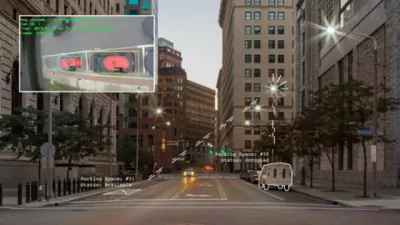Planners have debated for decades that surveillance cameras don't deter crime, more "eyes on the street" do. A recent study shows that the cameras are worth their expense, in some cases.
Results were best in Baltimore and Chicago, but not as much in Washington, D.C.
From the Urban Institute press release, authors of the study:
"Between 2007 and 2010, researchers from the Urban Institute's Justice Policy Center studied public surveillance systems in Baltimore, Chicago, and Washington, D.C., to measure the extent of their use, their effects on crime, their other benefits, and their costs.
While results varied by area, surveillance systems in Baltimore and Chicago produced more than enough benefits to justify their costs. No cost-benefit analysis was conducted in Washington, D.C., because the cameras didn't show a statistically significant impact on crime there.
Much of the cameras' success or failure depended on how they were set up and monitored, and how each city balanced privacy with security, said Nancy La Vigne, the study's lead researcher and the director of the Institute's Justice Policy Center.
"Overall, the most effective surveillance systems are those that are monitored by trained staff and have enough cameras to detect crimes in progress and investigate them after the fact," La Vigne observed."
FULL STORY: Surveillance Cameras Cost-Effective Tools for Cutting Crime, 3-Year Study Concludes

Maui's Vacation Rental Debate Turns Ugly
Verbal attacks, misinformation campaigns and fistfights plague a high-stakes debate to convert thousands of vacation rentals into long-term housing.

Planetizen Federal Action Tracker
A weekly monitor of how Trump’s orders and actions are impacting planners and planning in America.

In Urban Planning, AI Prompting Could be the New Design Thinking
Creativity has long been key to great urban design. What if we see AI as our new creative partner?

King County Supportive Housing Program Offers Hope for Unhoused Residents
The county is taking a ‘Housing First’ approach that prioritizes getting people into housing, then offering wraparound supportive services.

Researchers Use AI to Get Clearer Picture of US Housing
Analysts are using artificial intelligence to supercharge their research by allowing them to comb through data faster. Though these AI tools can be error prone, they save time and housing researchers are optimistic about the future.

Making Shared Micromobility More Inclusive
Cities and shared mobility system operators can do more to include people with disabilities in planning and operations, per a new report.
Urban Design for Planners 1: Software Tools
This six-course series explores essential urban design concepts using open source software and equips planners with the tools they need to participate fully in the urban design process.
Planning for Universal Design
Learn the tools for implementing Universal Design in planning regulations.
planning NEXT
Appalachian Highlands Housing Partners
Mpact (founded as Rail~Volution)
City of Camden Redevelopment Agency
City of Astoria
City of Portland
City of Laramie




























